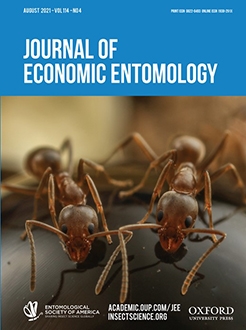Management of direct apple pests, such as codling moth, continues to be problematic despite the widespread implementation of behavioral and chemical controls. Apple growers have increased their use of netting to protect fruit from environmental injury, with some structures enclosing the entire orchard.These enclosures represent a new pest management tactic through physical exclusion. We conducted a two-year trial to examine the effects of full exclusion netting on pests and natural enemies of apples. Insect densities and damage in trees under fully enclosed (net) cages were compared with conventionally (insecticide only) treated and untreated plots. Caged plots had 18.1- and 11.4-fold less codling moth damage than the check, and 4.9- and 4.2-fold less damage than the insecticide-only plots in 2016 and 2017, respectively. However, densities of woolly apple aphid and its parasitoid Aphelinus mali (Haldeman) (Hymenoptera: Aphelinidae) were significantly greater in the caged plots. Densities of earwigs, a typically flightless generalist predator, were not different among treatments, while adults of more mobile flying generalist predators, lacewings and syrphids, were significantly lower in cages compared with uncaged plots.These results demonstrate that although biological control may be partially disrupted, net enclosures have significant potential as a holistic apple management technique.
BioOne.org will be down briefly for maintenance on 14 May 2025 between 18:00-22:00 Pacific Time US. We apologize for any inconvenience.
How to translate text using browser tools
24 May 2021
Efficacy and Nontarget Effects of Net Exclusion Enclosures on Apple Pest Management
A. T. Marshall,
E. H. Beers
ACCESS THE FULL ARTICLE
It is not available for individual sale.
This article is only available to subscribers.
It is not available for individual sale.
It is not available for individual sale.

Journal of Economic Entomology
Vol. 114 • No. 4
August 2021
Vol. 114 • No. 4
August 2021
codling moth
exclusion
natural enemy
nontarget effect
stink bug





